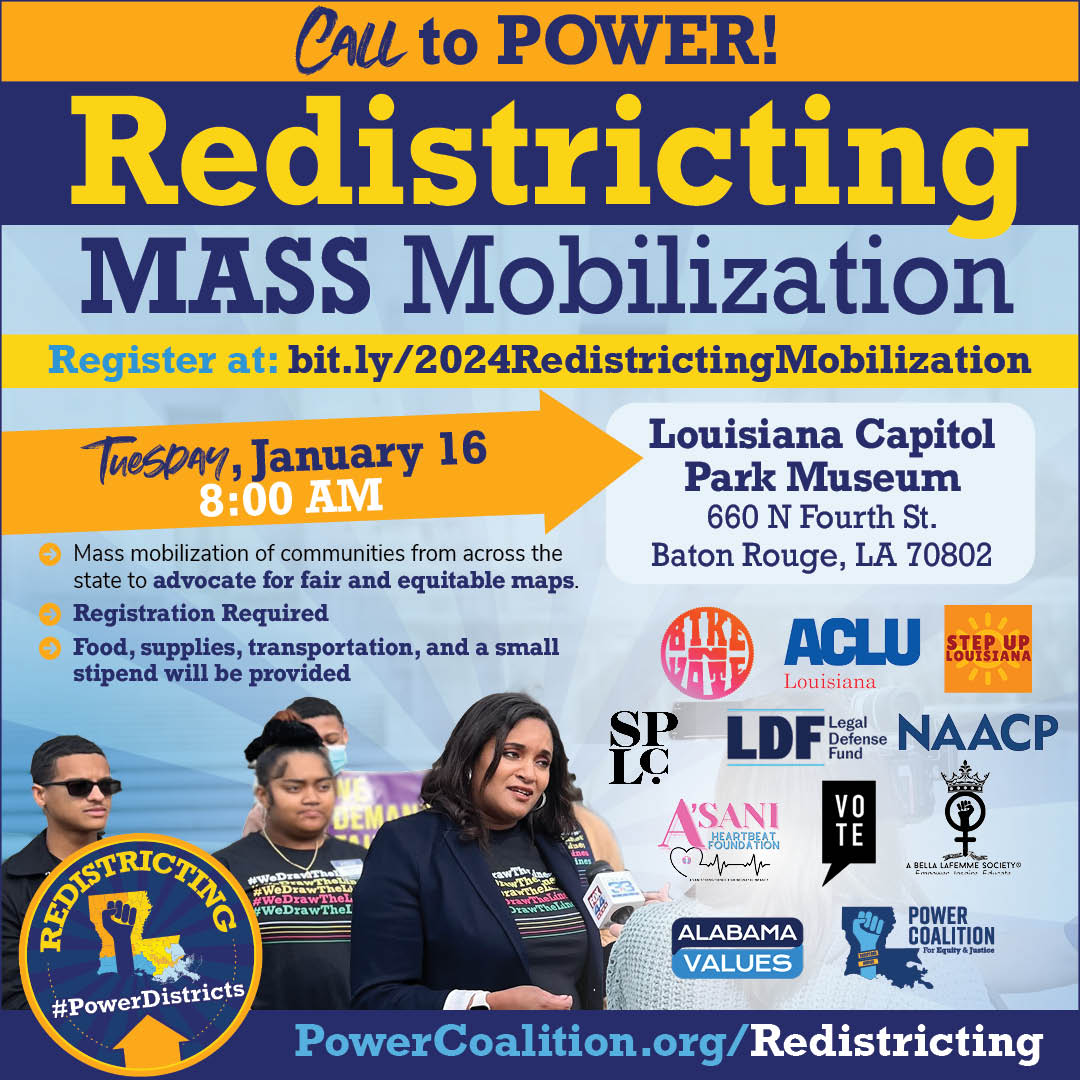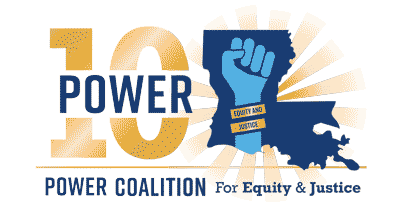
BATON ROUGE, La. – A pivotal Mass Mobilization Event is set for Tuesday, January 16, 2024, at 8 a.m. at the Louisiana Capitol Park Museum. Organized by Power Coalition, this event is a critical response to the special legislative session called by Gov. Jeff Landry, symbolically starting on Martin Luther King Jr. Day, underscoring the ongoing struggle for racial equality and fair representation. Collaborators include NAACP LDF,SPLC, ACLU Louisiana, Step Up Louisiana, Bike N Vote, A Bella La Femme Society,A’sani Heartbeat Foundation, and Alabama Values.
The event precedes the legislative session’s committee hearing and public testimony, starting with a training breakfast with legal experts Jared Evans and Victoria Wenger from the Legal Defense Fund.
Attendees will also receive additional education from the Power Coalition and other advocates regarding the ongoing fight for fair maps and how it’s connected to community issues. The mass mobilization is designed to educate and prepare community members to use their voices during the legislative process to advocate for the change they want to see in their communities. The attendees will march over to the Capitol ahead of the committee meeting.
Commissioner Davante Lewis, a plaintiff in the case adds, “This event is about more than just maps; it’s about ensuring that every voice in our state is heard and valued. We are here to empower our community to stand up for their rights and to hold our leaders accountable.”
The journey to this point has been marked by intense legal battles. Last year’s federal appeals court hearing in Robinson v. Ardoin questioned Louisiana’s compliance with a court-ordered approach to creating a new congressional district with a predominantly Black population.
The Fifth Circuit Court of Appeals on November 11, 2023, agreed with a lower court that the congressional map passed by the Louisiana legislature following the 2020 Census is discriminatory and likely violated the VRA. The Louisiana legislature has until the end of January to pass a map. If it fails to, the Fifth Circuit has ordered the lower court to promptly conduct a trial and adopt a remedial map that doesn’t violate the VRA.
This case, influenced by the Supreme Court’s decision in Alabama’s Allen v. Milligan, is critical for ensuring fair representation, considering Louisiana’s Black population constitutes one-third of the state’s residents. The ongoing legal challenges underscore the necessity of this redistricting effort to honor the promise of the Voting Rights Act.
Ashley K. Shelton, Founder, President & CEO of Power Coalition for Equity & Justice, highlights the significance of this moment: “This is a pivotal time for the people of Louisiana. They have persistently voiced their demand for change throughout this process. The Chief U.S. District Judge Shelly Dick’s ruling in our favor underscores the urgency of fair representation. We now stand at a crossroads where transformational change is not just possible but imperative.”
The lawsuit claims that the maps unfairly reduce the influence of Black voters in Louisiana and break the Voting Rights Act’s Section 2 by not creating a second district where Black voters are the majority. The maps concentrate Black voters from New Orleans and Baton Rouge into just one U.S. congressional district, significantly diminishing their voting impact. Although former Gov. John Bel Edwards rejected the maps, the legislature overruled the veto.
Jared Evans (LDF) confidently states, “We are on the cusp of a historic change. Black voters in Louisiana are closer than ever to having the representation they deserve. This week, we expect to see a shift towards fairness and equity in our electoral maps.”
The SCOTUS ruling in the Milligan case was a landmark decision with the high court reaffirming Section 2 of the Voting Rights Act and setting up the opportunity for other states — including Louisiana — to continue their lawsuits to have new maps enacted that give Black voters equitable voting power. In Louisiana, Black voters make up at least a third of the state’s population. A second majority-Black Congressional district would better serve the people of Louisiana. NAACP LDF has been at the forefront of the more than two-year battle to attain fair maps for the people of Louisiana and Alabama as they were the lead counsel in both the Milligan and Robinson cases.
Tori Wenger (LDF) emphasizes the legal journey: “Years of litigation and advocacy have led us to this moment. The LDF is proud to represent those who have fought tirelessly for fair representation. This session is a testament to their resilience and commitment to justice.”
The special session will kick off at 4 p.m., Monday, January 15, 2024, and must adjourn no later than 6 p.m., Tuesday, January 23, 2024, in which the legislature has another opportunity to create fair maps for Louisianians.
Carlos Pollard, Jr., Power Coalition for Equity & Justice, remarks, “This is the second special session regarding redistricting, another chance for our legislature to reflect the true diversity of Louisiana. We stand united in urging our representatives to pass a fair and representative map.”
To date, more than 100 community members have signed up to attend the event. The Mass Mobilization Event represents a collective call to action for fair representation in Louisiana. It embodies the collaborative efforts of various organizations and individuals in pursuit of a just and equitable political landscape. All community members, activists, and supporters are encouraged to attend this significant event to voice their support for fair representation in Louisiana’s congressional maps.
For more info and to register, please visit bit.ly/2024RedistrictingMobilization. Food, supplies, transportation, and a small stipend will be provided.
For more information or to schedule an interview, please contact Carlos Pollard, Jr. atcpollard@powercoalition.org or 504-906-4019.
###
Power Coalition for Equity and Justice is a team of organizations who believe in the power of community and taking action. Our goal is to equip our fellow Louisianans with the knowledge and information they need to find their voice and learn where and when to use it.

